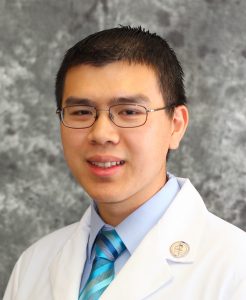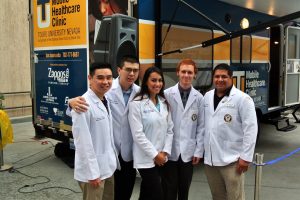Nevada’s PA-Practice Laws Creating Barriers to Care
PA’s Desire to Volunteer Delayed
September 19, 2018

Steven Xiao is a graduate of Touro University Nevada’s (TUN) PA Program where he was involved with the launch of a mobile health clinic prior to his graduation in 2015. The intention of the mobile clinic, which is supervised by TUN faculty, is to give PA students a real-world opportunity to hone their diagnostic skills by providing basic healthcare services to homeless and other underserved populations. After graduation, Xiao joined an urgent care practice, but also felt compelled to continue volunteering on the mobile clinic in order to give back to his community and continue educating PA students.
Unfortunately, he ran into some challenges due to current PA-practice laws in Nevada that delayed his ability to do so. Laws in Nevada require PAs to have an agreement with a physician in order to practice—even for volunteer work. Since the mobile clinic is a teaching clinic, the physician would also need to be faculty at TUN and many of the physicians already affiliated with the university that Xiao asked were already supervising the maximum number of PAs allowed by state law.
The agreement that Xiao is required to have with a physician did not require the physician to be on-site while Xiao provided care, however, physicians are regularly involved with the mobile health unit and are always available for consult by phone.
“As medical providers we’re armed with skills that enable us to give back to the community, so it’s frustrating when outdated and inefficient laws stand in the way of our ability to do so,” said Xiao. “I’m hopeful that laws governing PA-practice will quickly catch up with the healthcare needs of our state—as well as the entire country.”

In the end, Xiao found another physician at the urgent care clinic he worked at who decided to become adjunct faculty at TUN and sign an agreement allowing Xiao to volunteer.
For now, state laws requiring these agreements may continue to be a barrier for PAs and ultimately the patients they serve. However, it doesn’t have to be this difficult.
When PAs, physicians, and other medical professionals can work together to provide quality care without burdensome administrative constraints, they can achieve Optimal Team Practice. One way to achieve this is to remove the requirement for PAs to have an agreement with a specific physician. This will strengthen healthcare teams, expand access to care, reduce healthcare costs, and enable those like PA Xiao to use their skills to give back to their communities, regardless of whether they have a formal agreement with a specific physician.
Find out how PAs can contribute to Optimal Team Practice.
Thank you for reading AAPA’s News Central
You have 2 articles left this month. Create a free account to read more stories, or become a member for more access to exclusive benefits! Already have an account? Log in.


